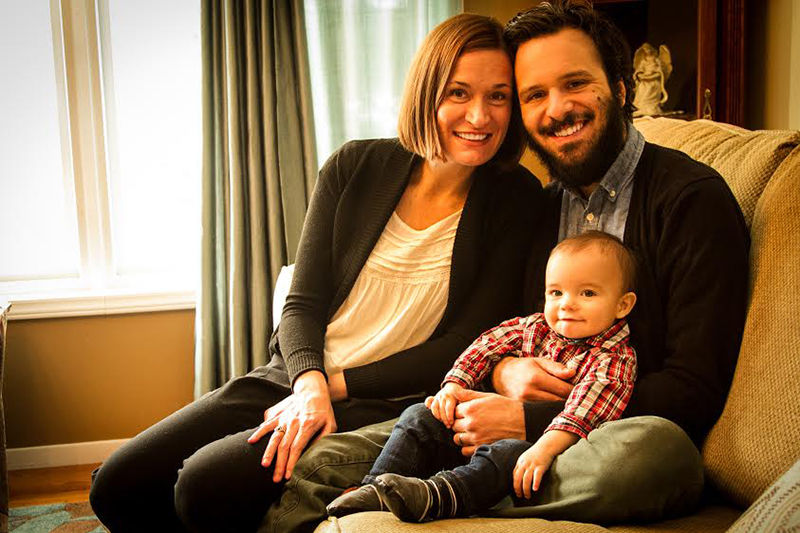Johnny Goraj is a singer-songwriter. His wife Felicia is a pediatric nurse.
They met at Children’s Hospital in L.A., where John was working as a trauma tech.
“We somehow saw each other as human beings rather than through a veil of lust or obsession,” Johnny says. Felicia continues, “I saw his spirit and he saw mine. Even though we had a 10-year age gap, I thought, ‘This person is full of love and someone I want to be around.’ “
Felicia had been raised Protestant. Johnny’s a cradle Catholic. Almost from the time they met until they got married, they went to Mass together every Sunday.
“I was always drawn to working with kids, but marriage and children had never been on my radar,” says Felicia. “Not until I met Johnny did I trust anyone enough to make that commitment, to enter into the sacrament, to raise a child together. That was miraculous to me. That was a conversion.”
Felicia told Johnny up front that for certain biological reasons she may not be able to bear a child.
“Johnny said, ‘No problem! We’re just going to trust God.’ He didn’t waver for a second,” recalls Felicia.
So they got married. Felicia was 37¬Ω by that time. Instantly their focus went to getting pregnant. “We trust God, but what day is it in my cycle? There was a lot of sadness, and grief and fear around lack of control. If God creates life, why won’t He create it in me? Why am I being set apart?”
In the infertility world, they also discovered, everything becomes medical. Everything was charted, measured. There wasn’t a lot of fun, of play. There was fear, stress.
After a year, they realized, “This needs to stop. This is not the way we want to have children.”
They suddenly saw that they wanted to be parents way more than they wanted to be pregnant.
A huge burden fell from their shoulders. Their whole focus shifted. They’d just moved to Nashville.
John made the initial calls to adoption agencies. “I was done with the sorrow. I was ready.”
They completed the home study — a thorough vetting process — through Catholic Social Services.
They were first presented with African-American twins, the product of rape. “John said, ‘Absolutely!’ [But] we ended up saying no because we weren’t comfortable with the ethics of the agency.”
Then through a friend they found a couple in South Dakota. The husband belongs to a prestigious nation-wide academy of adoption lawyers and Beth, the wife, has a passion for working with young birth mothers in the most difficult situations.
One day Beth called. “There’s a potential birth mom in Georgia, but she’s high-risk. Extreme poverty. Appalachia. And she’s already had a disruption with her first pregnancy” — meaning she’d planned to give the baby up for adoption, then changed her mind mid-stream.
Johnny and Felicia decided to move forward anyway. They drove to the Smoky Mountains in winter. They met Mandy and her mother at a McDonald’s.
“It was terrifying. We were shaking. We’d prayed beforehand: ‘Help us bring love, help us bring love.’”
Desperate to make conversation, Felicia blurted, “So — do you guys hike? Do you do yoga?”
“They just stared at me. They were like, ‘Can you buy us some food?’ They were bringing home a roadkill deer.”
Mandy was 7 ¬Ω months pregnant.
“A 20-year-old with no teeth, of course you think of meth. It didn’t seem like that, but we didn’t know the world she lived in. We weren’t sure she even had a house.”
With all that, they fell in love with her and Mandy “kind of fell in love with us.” Felicia had started RCIA in Nashville. She and Johnny decided to go forward. “We have to think of the child,” they kept telling themselves.
They were at the hospital when Soren was born. Mandy had 10 days following the birth to change her mind. They were terrified she would. Instead, she asked Felicia to be with her during the C-section.
“There’s a lot of joy and a lot of sadness. You’re getting a child and someone else is losing a child. Still, I still think Mandy knew in her heart of hearts: ‘I have to do this.’”
Soren turned out to be in withdrawal. The doctors were never sure why. It wasn’t necessarily because Mandy was on drugs. The baby had to be put on methadone and go into the NICU for three weeks. Johnny and Felicia stayed on and visited him every day.
Last fall, the family returned to L.A. The adoption is open. Their relationship with Mandy continues.
As we wind up our conversation, Soren is eating a banana and crooning.
“We go in and check on him 50 times a night,” says Johnny. “We send each other pictures of him constantly. We rejoice at this beautiful son we’re being allowed to care for.”
Felicia adds, “Sometimes we look at each other and say, ‘Thank God we went through all this pain.”
“Thank God we never decided to walk away.”
Their eyes meet across Soren’s high chair. “Thank God we couldn’t get pregnant.”
Heather King is a blogger, speaker and the author of several books.

